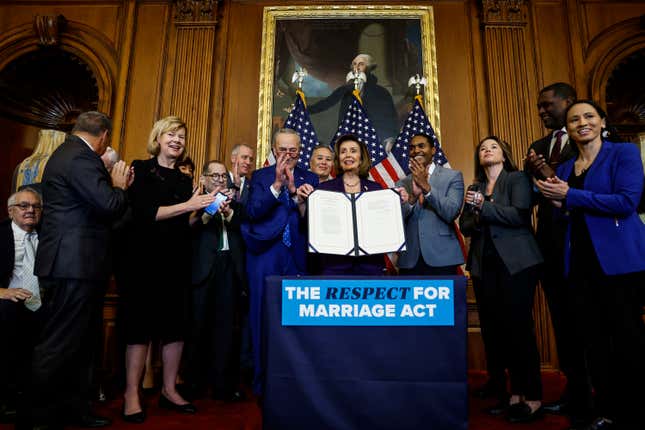
Just when you think Congress is too dysfunctional to get anything done, they go ahead and pass some major legislation. On Thursday, the House gave final approval for The Respect for Marriage Act, which means the bill will be sent to President Joe Biden for his signature.
Biden says he will promptly sign the legislation which gives legal protections to same-sex marriage. He called the bill a “critical step to ensure that Americans have the right to marry the person they love.”
The legislation protects the right to same-sex and interracial marriage by requiring states to recognize legal marriages regardless of “sex, race, ethnicity, or national origin.”
It passed Congress with a 258-169 vote, according to the AP. Thirty-nine Republicans, including Susan Collins (R-ME) and Thom Tillis (R-NC), voted alongside Democrats to pass the bill.
The bill is a major relief for the hundreds of thousands of same-sex couples who’ve been married since the 2015 Obergefell decision. Concerns over whether the Supreme Court could overturn the right-to-marriage decision have been rampant since the court reversed Roe v. Wade.
Back in July, The Root spoke with legal experts about what the decision to end 50 years of precedent on abortion rights could mean for other important cases like the right to same-sex marriage.
“What is terrifying to me is that they took the biggest issue and just did away with it first,” says Meg York, a family law attorney at Vermont Law School’s South Royalton Legal Clinic.
York says that any of the Supreme Court cases that rely on substantive due process, which protects implied fundamental rights like the right to privacy (abortion is considered a privacy right) and the right to marriage, could be up for grabs.
“They’re… saying we don’t care about stare decisis. We don’t care about precedent. We think that we don’t like this, and so we’re going to change it,” she says. “And that’s scary because that means so many of these decisions that we’ve come to rely on… they all suddenly feel vulnerable.”
Justice Clarence Thomas explicitly called for overturning Obergefell v. Hodges, which protects the right to same-sex marriage, and Lawrence v. Texas, which made it unconstitutional to criminalize consensual sexual activity between people of the same sex.
Thomas did not call for overturning Loving v. Virginia, which established the right to interracial marriage even though it’s based on the same legal foundation he took issue with in Obergefell and Lawrence.
It’s worth noting that Thomas is in an interracial marriage with right-wing political activist Ginni Thomas.
The fact that protections for interracial marriage and same-sex marriage have been codified is a huge relief in this time of judicial uncertainty.